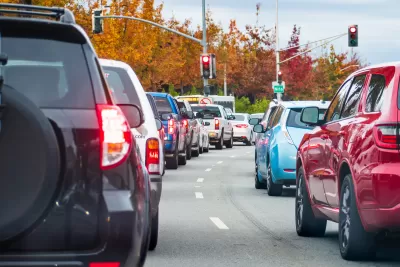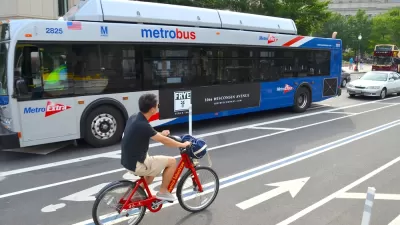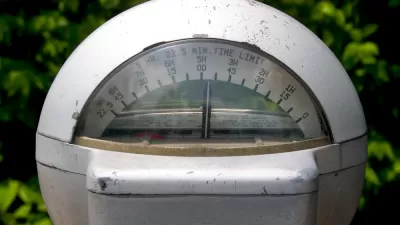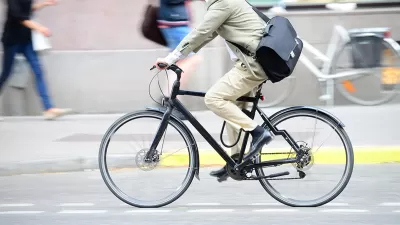‘Free’ employee parking increases driving. Parking cash-out laws reward commuters who use climate-friendly modes, which increases fairness and reduces traffic problems.

A new study for the Federal Highway Administration, An Assessment of the Expected Impacts of City-Level Parking Cash-Out and Commuter Benefits Ordinances, analyzed and evaluated the effects of parking cash‑out ordinances on vehicle travel, congestion, Greenhouse Gas emissions, crashes, and equity in nine U.S. cities.
Cashing out parking typically reduces affected automobile travel 10-30 percent, depending on the value of the incentive, and various factors. The more flexible the incentive, the greater the impact. For example, parking cash-out tends to cause larger vehicle trip reductions than transit subsidies because it rewards any alternative mode, and daily benefits tend to have larger effects than monthly benefits because they encourage even occasional shifts to non-auto modes.
This study evaluated five scenarios:
1. Monthly Parking Cash-Out: This is an ordinance that requires employers that offer free/subsidized parking to offer employees the option to cash-out their parking on a monthly basis.
2. Monthly Commuter Benefit (Employer-Paid Transit/Vanpool Benefit): This is an ordinance that requires employers providing free/subsidized parking to offer employees a transit or vanpool benefit paid by the employer, but not in excess of the value of the parking benefit.
3. Monthly Parking Cash-Out and Pre-Tax Transit Benefit for Employees Without
Subsidized Parking: In addition to requiring that employers that subsidize parking offer a monthly parking cash-out option (same as Scenario 1), all other employers must make pre-tax transit benefits available to all of their employees. This scenario applies a requirement to all worksites—those that provide free or subsidized parking and those that currently do not.
4. Daily Parking Cash-Out and Pre-Tax Transit Benefit for Employees Without
Subsidized Parking: This scenario is the same as Scenario 3 with the difference that the parking cash-out must be offered as a daily cash-out option, rather than monthly. In addition to requiring that employers that subsidize parking offer a daily parking cash-out option, all other employers must make pre-tax transit benefits available to all of their employees.
5. Requirement to Eliminate Subsidized Parking Benefit + Provide Universal $5 Per Day Employer-Paid Non-SOV Commute Benefit: An ordinance that requires employers that are offering their employees free/subsidized parking to cease offering it and for all employers to offer an employer-paid non-SOV commute benefit of $5 per commute day.
The study estimated that basic monthly cash-out requirements would reduce commute-related VMT by an average of over 7 percent across all analyzed cities, with wide variation among the cities—from about a 3 percent reduction in New York City, where few employees currently receive free parking, to a 13 percent reduction in Philadelphia. Daily versus monthly cash-out policies may yield greater impacts. The most aggressive option tested, which involved eliminating commuter parking subsidies and offering a $5 daily cash benefit to commuters that use non- single occupancy vehicle modes is predicted to reduce commute vehicle travel by 17 percent to 36 percent. Since most of this reduction would occur during peak commute hours, parking cash-out can significantly reduce congestion and other negative traffic externalities.
Yale Climate Connections produced a podcast that summarizes the results of this study:

Alabama: Trump Terminates Settlements for Black Communities Harmed By Raw Sewage
Trump deemed the landmark civil rights agreement “illegal DEI and environmental justice policy.”

Planetizen Federal Action Tracker
A weekly monitor of how Trump’s orders and actions are impacting planners and planning in America.

The 120 Year Old Tiny Home Villages That Sheltered San Francisco’s Earthquake Refugees
More than a century ago, San Francisco mobilized to house thousands of residents displaced by the 1906 earthquake. Could their strategy offer a model for the present?

Ken Jennings Launches Transit Web Series
The Jeopardy champ wants you to ride public transit.

BLM To Rescind Public Lands Rule
The change will downgrade conservation, once again putting federal land at risk for mining and other extractive uses.

Indy Neighborhood Group Builds Temporary Multi-Use Path
Community members, aided in part by funding from the city, repurposed a vehicle lane to create a protected bike and pedestrian path for the summer season.
Urban Design for Planners 1: Software Tools
This six-course series explores essential urban design concepts using open source software and equips planners with the tools they need to participate fully in the urban design process.
Planning for Universal Design
Learn the tools for implementing Universal Design in planning regulations.
Clanton & Associates, Inc.
Jessamine County Fiscal Court
Institute for Housing and Urban Development Studies (IHS)
City of Grandview
Harvard GSD Executive Education
Toledo-Lucas County Plan Commissions
Salt Lake City
NYU Wagner Graduate School of Public Service





























